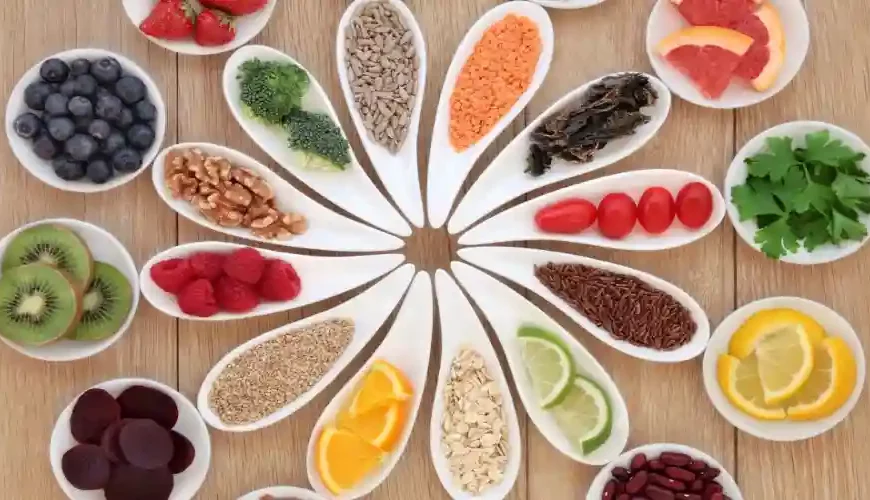Eating a healthy diet is important. But it can be difficult to make changes in your eating habits. These daily tips can help you eat better and feel healthier.
Try to avoid foods that are “off-limits.” Instead, focus on replacing unhealthy fats and sugar with healthy ones (such as switching fried chicken for grilled salmon). Make sure your meals have a mix of protein sources.
1. Eat a variety of foods.
Eating a variety of foods is important because it provides your body with different nutrients. Concentrating on one food group can leave you short of essential vitamins and minerals.
Try to eat fruits, vegetables, whole grains, nuts and seeds, low-fat dairy and lean meats – in the right proportions. Include fish a few times a week – it’s rich in omega-3 fats, which can lower your risk of heart and circulatory disease.
Avoid junk foods, which are often high in fat, salt and sugar – but don’t deprive yourself. Plan ahead by stocking up on healthy options, such as wholegrain granola or muesli for breakfast and yoghurt with fruit; keep chopped vegetables, slices of cucumber or carrot, or a wholemeal roll with vegetable filling at home for quick snacks.
2. Eat more protein.
Protein is key to keeping your body’s muscles healthy. It also provides other important nutrients like iron and zinc. But be careful about eating too much protein, as it can increase your risk of weight gain.
Stick to whole foods for your protein, rather than packaged options like veggie nuggets or burgers. These often come with extra fat, salt and calories.
Increasing your protein intake can help you manage hunger and cravings, especially when trying to lose weight. It also helps you burn more calories by having a higher thermic effect than carbohydrates or fats. A well-rounded high-protein diet includes lean proteins, nutrient-packed vegetables and berries, and whole grains.
3. Eat less sugar.
Many drinks, sauces and breakfast foods contain more sugar than you may realize. Reading labels and swapping out products containing added sugar for those made from whole foods, like homemade salad dressings and sauces, lower-fat milk and yogurt, and fresh or frozen vegetables and fruits can help reduce your sugar intake.
Consuming too much added sugar leads to a host of health problems, including obesity, heart disease and some cancers. Cutting out even a teaspoon of sugar each day can trim thousands of calories from your diet. Eating less sugar can also improve your mood and give you more energy. Start small and gradually cut out added sugars, then replace them with healthier alternatives.
4. Eat more vegetables.
Aiming for the recommended five serves of vegetables a day is one of the easiest ways to improve your health. Vegetables contain important nutrients that fight disease and keep your body healthy.
Try to add a variety of vegetables each week. Eat a rainbow of colours – purple cabbage, red radishes and orange carrots – to get different combinations of nutrients.
Adding more vegetables to your meals can be as easy as topping a smoothie or eating a salad for breakfast. You can also sneak vegetables into dishes like stews, omelets and pasta sauces. Boost your immune system with vitamin C, keep your eyes healthy with folic acid and promote skin health with lycopene found in tomatoes.
5. Eat less fat.
Healthy eating is about a balanced diet that includes plenty of vegetables, whole grains, and lean meats and beans. These foods are naturally low in fat, whereas processed foods often contain a lot of saturated and trans fats, which are associated with increased heart disease risk.
A gram of fat provides 9 kilojoules of energy, compared to 4 kilojoules for carbs and protein. However, not all fats are equal. Aim for unsaturated fats (monounsaturated and polyunsaturated) from plant sources such as olive oil, avocados and nuts.
Avoid trans and saturated fats found in meat, pies, pastries and takeaways, which have been linked to high cholesterol levels, an increased risk of heart disease and other health problems.
6. Eat more whole grains.
Eating whole grains is important because they are a good source of complex carbohydrates, fiber and nutrients. They contain B vitamins, iron and magnesium, which are important for health.
A number of epidemiology studies show that people who eat more whole grains have a lower risk for heart disease. However, it’s not clear whether this is due to the whole grain intake or other factors, such as healthier lifestyle choices.
To make sure you’re getting enough whole grains, look for the “whole grain” claim on food packaging. You can also check the ingredient list. Look for whole wheat, brown rice and oats. Try adding quinoa, amaranth or barley to your diet.
7. Eat less junk food.
Junk foods like chips, cookies, pizza and soda may make you feel good for a moment, but they can also contribute to weight gain and high blood sugar and cholesterol levels. It is important to cut these foods out of your diet as much as possible.
Avoid buying junk food in large packs and limit your portion sizes. When eating out, choose low-fat proteins like lean meat, chicken and fish. Reduce saturated fat by choosing baked or grilled over fried foods and using less butter on bread. Drink water instead of soda and other sugar-sweetened beverages. Eat with others whenever possible, to slow down and enjoy your meals.
8. Eat more water.
You’ve probably heard the recommendation to drink “eight glasses of water a day.” This is an easy-to-remember goal and it is generally a good general rule.
Water is the best beverage for hydration because it does not contain any energy (kilojoules). Milk (low-fat or non-fat) and tea are also important sources of fluids in healthy diets.
Try to avoid beverages with added sugar and salt — they can add up quickly. And if you are craving something sweet, have a piece of fruit instead. The best way to make healthy choices is to gradually build them into your routine, bite by bite. Trying to overhaul your entire diet all at once can feel overwhelming and lead to failure.










